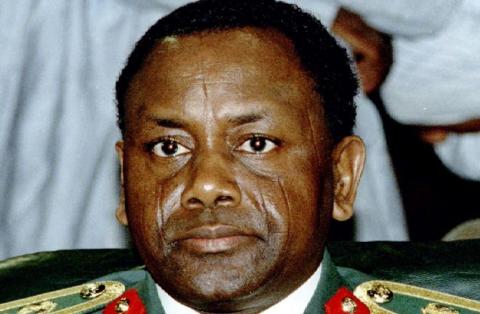
Nigeria wanted the crime-fighting agency, NCA, to release funds that it froze at the request of US authorities.
The Nigerian government is locked in a court battle with Britain’s National Crime Agency (NCA) over control of €180million (£150million) that was stashed abroad by Nigeria’s former Head of State, late Gen. Sani Abacha.
According to UK’s The Telegraph, the case was again poised to spark fresh questions about dirty money flowing through the City of London.

In the latest legal tussle over the money, generally known in Nigeria as “Abacha loot”, the report stated that Nigeria wanted the crime-fighting agency, NCA, to release funds that it froze at the request of US authorities.
In May 2020, the Nigerian government confirmed the receipt of $311million looted by the late dictator repatriated from the United States and Island of Jersey.
According to Attorney General of the Federation and Minister of Justice, Abubakar Malami, “The amount increased significantly from over $308million to over $311million because of the interest that accrued from February 3, 2020, to 28th April, 2020, when the fund was transferred to the CBN.”
It came after the recovery of $322million from Switzerland in 2018.
At the time, Malami noted that the government had committed that the asset would support and assist in expediting the construction of three major infrastructure projects across Nigeria, namely, Lagos – Ibadan Expressway, Abuja – Kano Road, and Second Niger Bridge.
It was estimated that from 2007 to 2020, about $1.5billion had been returned to Nigeria from different parts of the world.
According to the latest report, American prosecutors said the money could be traced back to a suspected $2.2billion (£1.6billion) or more that was plundered by Abacha and his associates during the dictator’s five-year reign.
In the complex issues surrounding the repatriation of the funds, the authorities in the US sought to return the money to “the people of Nigeria”, under the so-called Kleptocracy Initiative.
But the Nigerian government was said have sought to “sidestep” the process and obtain the funds directly through an application to the High Court, in a move opposed by UK and US authorities, documents seen by The Telegraph and SourceMaterial showed.
Although Abacha died more than 20 years ago, the piles of treasure he looted from Nigerian coffers have kept cropping up, with at least $2billion being thought to have stolen during his five years in power.
The former dictator’s spoils have been linked to dozens of offshore bank accounts over the years, as investigators unravel the intricate web he and his associates spun across the globe.
British and American authorities have been locked in talks over tens of millions of pounds of cash that investigators say can be traced to Abacha’s plundering, the investigation found.
The case, which involves a serving Nigerian politician who was one of Abacha’s top henchmen, includes cash in British bank accounts that has been frozen by the National Crime Agency.
However, the Nigerian government has brought its own legal action against the NCA in a bid to end the tussle, it has emerged.
The report stated, “It is a complicated story with many twists and turns. But the on-going struggle for ‘Abacha’s loot’ reveals the difficulty in recovering stolen funds, the frustrations of law enforcement, and the way people accused of corruption have relied on respectable law firms to argue their cases in court.”
On the modus operandi used by Abachi to execute the looting, the report stated that after seizing power in a 1993 coup, Abacha set about using his position as Nigeria’s head of state to place himself above the law and skim vast sums of money from the oil-rich nation.
In perhaps the most brazen example, he would tell advisers to make spurious requests to him for money to deal with national “emergencies”, according to US court documents.
Signed letters would then be sent to the CBN, which would provide cash, travellers’ cheques or arrange a wire transfer.
The report added, “Money was stuffed into boxes or bags and transported to Abacha’s house, before associates arranged for it to be sent abroad.
“At least $2 billion is thought to have been stolen this way, using more than 60 letters to the central bank. Abacha also arranged for the government to sell bonds to a company controlled by his allies before buying them back at vastly inflated prices, generating an illicit windfall of $282 million.”
Separately, the report stated that Abacha and his associates extorted French engineering firm, Dumez Group, of $97 million and used his spoils to live a luxurious lifestyle.
“Inside his many sprawling homes, he kept piles of glittering jewellery, including gold necklaces and rings, and at one stage as much as $100 million in cash,” the report noted.
However, the money Abacha and his associates plundered became the subject of an international search after the dictator’s sudden death in 1998, aged 54.
The report stated that weeks after his death, Abacha’s widow was caught trying to flee the country with 38 suitcases packed with money and his family later forfeited nearly $1billion.